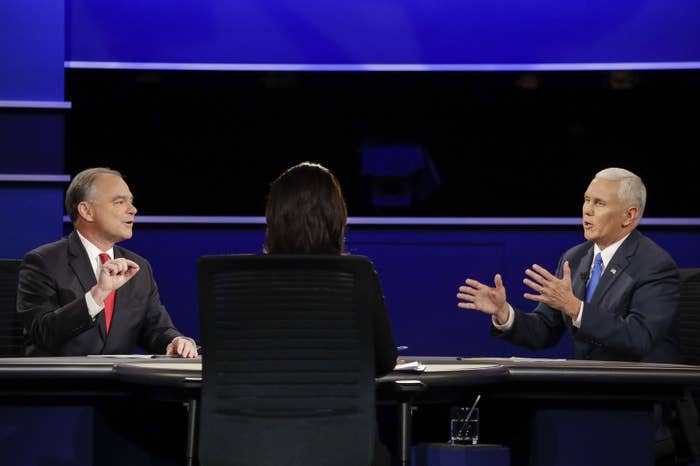
FARMVILLE, Va. — At the first presidential debate, Trump's signature wall along the U.S.-Mexican border did not come up.
On Tuesday, Tim Kaine and Mike Pence dove deep into immigration, retreating to their respective sides, debating both the merits of Clinton and Trump's plans — the most expansively liberal and restrictive immigration plans, respectively, in recent decades — but also accusing each other of being the extreme ticket on the issue.
Pence began by saying Trump laid out a plan to end illegal immigration once and for all, leaning on Trump's fiery Phoenix speech, in which he said his great wall would rise in the south, "criminal aliens" had to be deported, and visa overstays and sanctuary cities had to come to an end, all because the wages of American workers were being driven down.
But the conversation on immigration from the two vice presidential nominees also heavily reflected the charged way the issue has been used during the 2016 race, with Pence claiming that Clinton advocates "open borders." (Her campaign quickly sought to refute, sending out an email linking to fact-checking website Politifact, which said it was a "huge distortion" of her proposals.)
Kaine, who whiffed on canned lines during the debate at moments early in the debate, delivered his immigration one more successfully.
"Hillary and I believe in comprehensive immigration reform," Kaine said, while "Donald Trump believes in deportation nation. You've got to pick your choice."
Kaine said the campaign's plans revolve chiefly around keeping families together, while focusing enforcement efforts on those who are violent, and allowing undocumented immigrants in the country who are working hard and paying taxes to eventually become citizens.
But Kaine too had a whopper for Pence — Trump wants to deport 16 million people, Kaine charged, adding the roughly 11 million undocumented immigrants in the country illegally and 4.5 million children of immigrants who benefitted from the 14th Amendment to the constitution, which confers birthright citizenship.
On this one Kaine didn't just seek to tie Pence to Trump, but brought up Pence's support for a bill in 2007 and 2009 when he was in Congress that would redefine birthright citizenship, limiting it for children "who have at least one parent who is a U.S. citizen, legal permanent resident or is serving on active duty in the military," the Associated Press reported in July.
Pence said claims of 16 million deportations led by a deportation force were "nonsense" and that the real deportation force already exists — Immigration and Customs Enforcement, noting that their union endorsed Trump.
After a shaky start, Kaine delivered more strongly when he pressed Pence on defending Trump's most controversial statements, that Mexicans are criminals and rapists and that Gonzalo Curiel, the Mexican-American judge overseeing the Trump University lawsuit, was incapable of doing his job because of his ethnicity.
"Again, he refused to defend Donald Trump’s racist comments about a judge in his own home state," said Clinton's campaign manager Robby Mook in the spin room after the debate, of Pence, who was the governor of Indiana, where Curiel is from.
"The policies he laid out do speak to the core contrast in this race, which is that Secretary Clinton and Sen. Kaine do support comprehensive immigration reform, Donald Trump does not," Mook continued.
But Trump senior advisor A.J. Delgado argued that Clinton's plan is the radical one — focused more on undocumented immigrants than American workers.
"It's really just what else can we do for the illegal immigrant that we haven’t done already — it's quite radical, it's quite frightening," said Delgado, who is a Cuban-American from Florida and served as a surrogate before joining the campaign.
Leslie Sanchez, a veteran GOP strategist said Pence's opening salvo on immigration was politically savvy. "The best part of that argument is that Pence started with 'you are for open borders,' because even conservative Democrats don’t support that."
Clinton campaign surrogates were happy to pile on Pence, using the same strategy Kaine did, charging that Pence was unwilling to defend Trump's most polarizing statements.
"Getting rid of birthright citizenship is totally unconstitutional to such an extreme that almost no rational candidate would bring it up," said Arizona Rep. Ruben Gallego. "Mike Pence obviously ignored all of this because its an indefensible position. It's unpopular, like the wall is unpopular."
Kaine repeatedly said that Pence would not defend Trump, eventually irritating Pence. "Don't put words in my mouth that I won't defend him," Pence said.
Kaine unloaded the greatest hits of all of Trump's insults — to immigrants, women, and John McCain — so often, that Pence awkwardly responded to a relitigation of the comments about Mexicans late in the debate with, "Senator, you whipped out that Mexican thing again."
"And many of them are good people," Pence said to Kaine, reminding him of the way Trump initially sought to soften his comments when he launched his campaign.
The exchange led to the #ThatMexicanThingAgain hashtag on Twitter for some Latinos who were offended by Pence's inelegant phrasing and a website from the Voto Latino Action Network to register Hispanics at thatmexicanthing.org.
While each side felt they got the better of the exchange on immigration — comfortable in the knowledge that their base voters heard what they wanted to hear — the real test will come when the two presidential candidates try their hand at defending their signature immigration policies.
Trump, for example, does not explain his immigration plan as clearly as Pence did. During his Phoenix speech he barely touched on what he would do with undocumented immigrants who are not violent criminals and will not be subject to deportation.
For her part, Clinton will face the challenge of selling how she can successfully pass an immigration package on legislation that has eluded president after president.
But those questions didn't really matter Tuesday night, with each side celebrating the fact that they heard what they believe on immigration. Afterwards, in the spin room, Gallego characterized the Republican ticket platform on immigration.
"Pence and Trump's plan," Gallego said to Telemundo in Spanish, before ending an interview and turning to other reporters. "Deportation first, deportation second, and deportation third."

